As a way to improve client relationships, it's essential to know what is a CRM in real estate. Most established real estate companies utilize a comprehensive set of customer relationship management tools to help track and manage each client in more detail. These organizational tools help streamline transactions and incur better reliability as a business.
But before you start choosing any CRM platform on the market, it's essential to learn about the various functions and features each software has to help gain an edge on your real estate business.
Our team at Aloa empowers our clients to find the best possible match for software developers to ensure they have all the necessary tools for a thorough customer relationship management system. Understanding what is a CRM in real estate enables your business to provide better stability in managing each customer database. Our developers are equipped with the skills to formulate that software.
In this blog post, we will discuss what is a CRM in real estate and the real estate tech trends they follow. Also, this post shall explain the various functions and features to look out for when choosing among the popular real estate software solutions and CRMs that fits the specific requirements of the real estate industry in 2023.
Let's begin!
What Is a CRM in Real Estate?
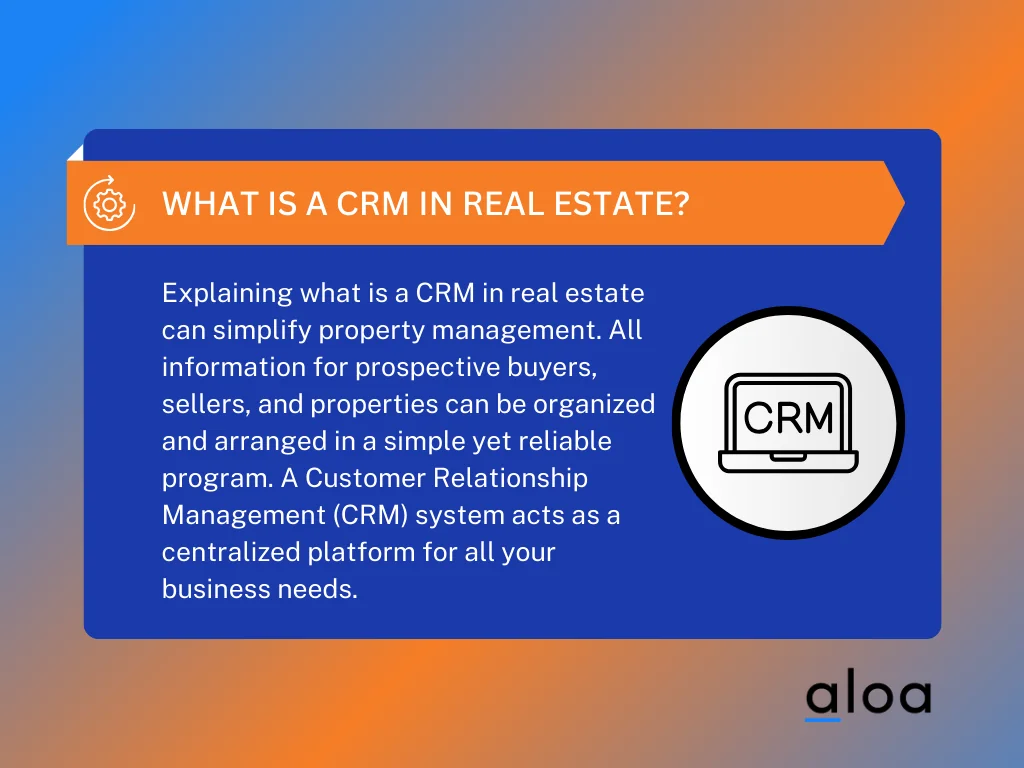
Explaining what is a CRM in real estate can simplify property management. All information for prospective buyers, sellers, and properties can be organized and arranged in a simple yet reliable program. A Customer Relationship Management (CRM) system acts as a centralized platform for all your business needs.
Do note that different CRM programs can offer widely different features and functions. CRM software is also applicable for management and administrators to keep track of each real estate agent and their partners to ensure that each component of the company works in tandem with one another.
How To Decide on The Best CRM Based on Your Needs
Deciding on what is a CRM in real estate that works for your business can be overwhelming with the number of options available on the market. However, defining your company's needs is a critical component to ensuring that all your CRM's functions and features comply with your business's needs. In some cases you may also consider custom CRM development, which allows you the freedom to choose the precise features and functions that best fit your business needs.
These are ways to help you decide on the best CRM for your real estate needs:
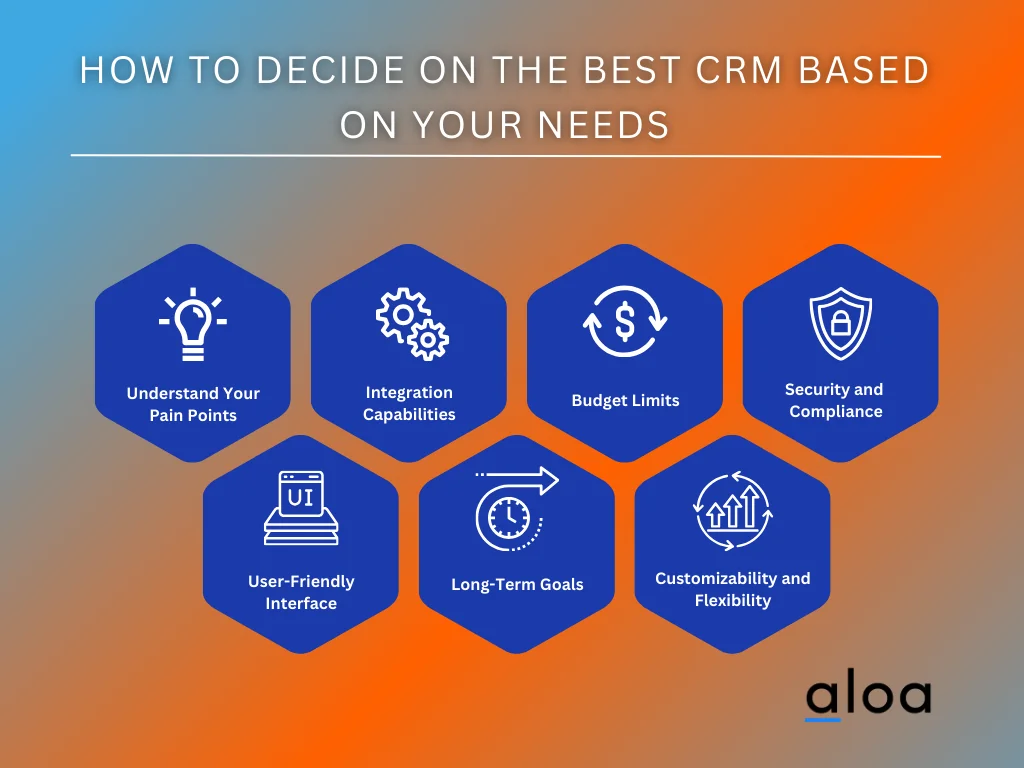
Consideration 1: Understand Your Pain Points
The first consideration to take when building real estate software tools like a CRM, are the pain points it aims to address. A pain point can be defined as a problem or issue that needs to be addressed in order to improve the user experience. It is important to identify these pain points in order to know what features to incorporate into the CRM.
Suppose your company struggles with maintaining large fluxes of information. In that case, a system that is easily organized in whatever method you prefer can automatically improve the management system. On the other hand, businesses that require CRM software that can automate notifications from one sector of your real estate company to another can utilize features such as contact management or schedule setting to better streamline workload.
Here are a few pain points that often arise for real estate professionals when managing information systems:
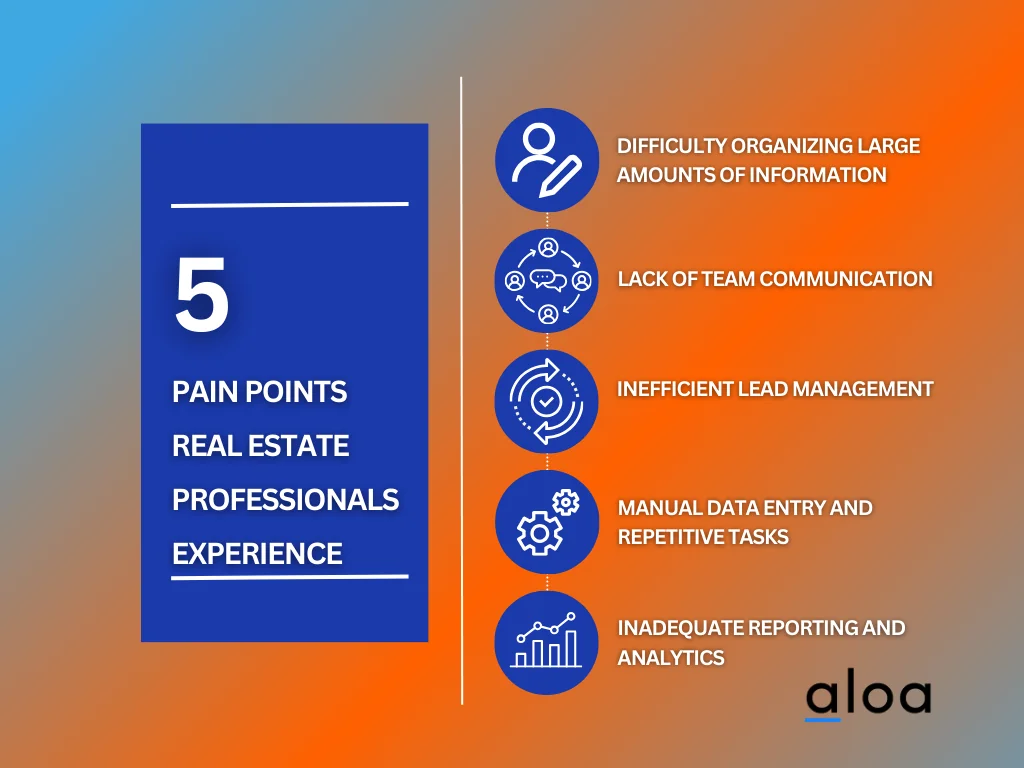
- Difficulty organizing large amounts of information: If your company struggles with organizing and managing a large volume of data, looking for a CRM system that offers robust organizational features is essential.
- Lack of team communication: Look for features like shared calendars, task assignments, and real-time messaging to improve team collaboration and communication.
- Inefficient lead management: Features like lead tracking, automated follow-ups, and lead scoring streamline your lead generation process.
- Manual data entry and repetitive tasks: Features like email templates, workflow automation, and integration with other software can help automate tasks and save time.
- Inadequate reporting and analytics: This can include customizable dashboards, visualizations, and the ability to generate detailed reports on key metrics such as sales performance, lead conversion rates, and marketing campaigns.
Choosing to prioritize the limitations currently set by your system enables users to select features that matter the most to improve their customer relationship management experience.
Consideration 2: Integration Capabilities
A CRM system is only as helpful as the tools it allows companies to utilize. The real estate industry requires various tools and programs to ensure businesses operate smoothly. Consider using a robust CRM strategy incorporating integration capabilities with your existing sales process.
Integrating existing software into your CRM speeds up the overall workflow of your real estate business. It enables all team members to access critical information in one location.
Consideration 3: Budget Limits
CRM systems can have varying costs depending on the number of features and functions included in the software package. Savvy real estate companies can take this opportunity to communicate with their sales CRM team to determine the value of each program and determine if the program's overall cost is worth the price point set.
It's important for real estate agencies to also consider the total cost of ownership, including the licensing fees, implementation costs, training expenses, and potential ongoing maintenance costs of both the CRM software and their other tools.
Consideration 4: Security and Compliance
The real estate business involves a steady flow of sensitive customer data. Agents who understand what is a CRM in real estate can better serve their clients through better customer service by ensuring that the platform that your team members use complies with all security protocols to prevent any information from being leaked.
This data security should also coincide with your company's personal information being leaked. Check for approvals from various security firms before settling with a CRM platform to keep client data safe and secure.
Consideration 5: User-Friendly Interface
A significant component that should always be considered when understanding what is a CRM in real estate is its user-friendliness. A simple-to-use interface can minimize the amount of training needed for your teams to adjust, and it can also help with backtracking from past data, making it easier to handle for employees. Here are a few user-friendly features that you'll find in the best CRMs for real estate investors:
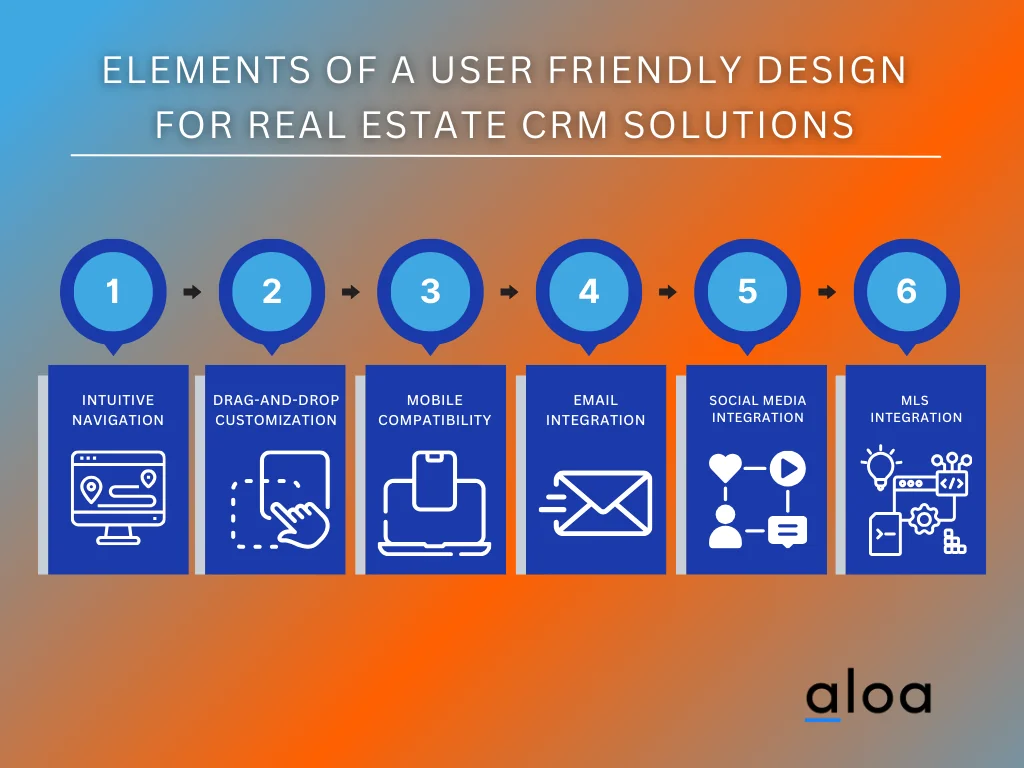
- Intuitive navigation: The CRM should have a clear and easy-to-follow menu structure, allowing users to quickly access different functionalities without getting lost in complex menus.
- Drag-and-drop customization: A user-friendly CRM should allow for easy customization. Agents should be able to personalize their dashboard, add or remove fields, and rearrange elements with a simple drag-and-drop interface.
- Mobile compatibility: In today's fast-paced world, real estate professionals are constantly on the go. Therefore, a CRM that offers mobile compatibility is essential.
- Email integration: A CRM that integrates with your email client can automatically sync emails, contacts, and calendar events, allowing you to keep track of all communication in one place.
- Social media integration: In today's digital age, social media plays a crucial role in real estate marketing.
- MLS integration: Multiple Listing Service (MLS) is an essential tool for real estate agents to access and share property listings. A CRM that integrates with MLS allows agents to easily import and update property data, saving time and ensuring accuracy.
A user-friendly design is also categorized by the CRM's ability to be customizable to suit the needs of each client. Adding separate categories such as a potential client's property preferences, communication history, and any other relevant data should be a critical component to look for to help your CRM database grow in a uniform structure.
Consideration 6: Long-Term Goals
A CRM is not only a tool that aids in managing customer data, but it can also provide a clear view to help potentially scale your real estate business into specific avenues. Take this opportunity to communicate with your team about the different options your company can take with the data collected using the CRM system to help establish long-term goals for your company.
Data collection and the scalability potential are heavily determined by the quality of the CRM software used. If your real estate company has an already thought-out plan for its growth, it is easier to utilize your CRM to operate under your exact specifications.
Consideration 7: Customizability and Flexibility
CRMs provide a better platform for companies to manage an influx of data and organize them into easily understandable data. Choosing a CRM system that offers plenty of customizability and flexibility can help break down various information into usable data that users can utilize to help monitor different avenues of your business strategy.
Flexibility in a CRM is also showcased in its ability to allow multiple users or teams to use the system without causing issues for the software. Most CRM services would have different pricing options to the number of integrations and administrators allowed to access the system, which can cause problems for larger real estate corporations.
Real Estate CRM Use Cases
Investors frequently inquire, "What is a CRM in real estate, and how can it benefit us?" Fortunately, real estate CRM offers plenty of advantages that even small businesses can make the most out of its services.
Here are some of the best use cases for real estate CRMs:
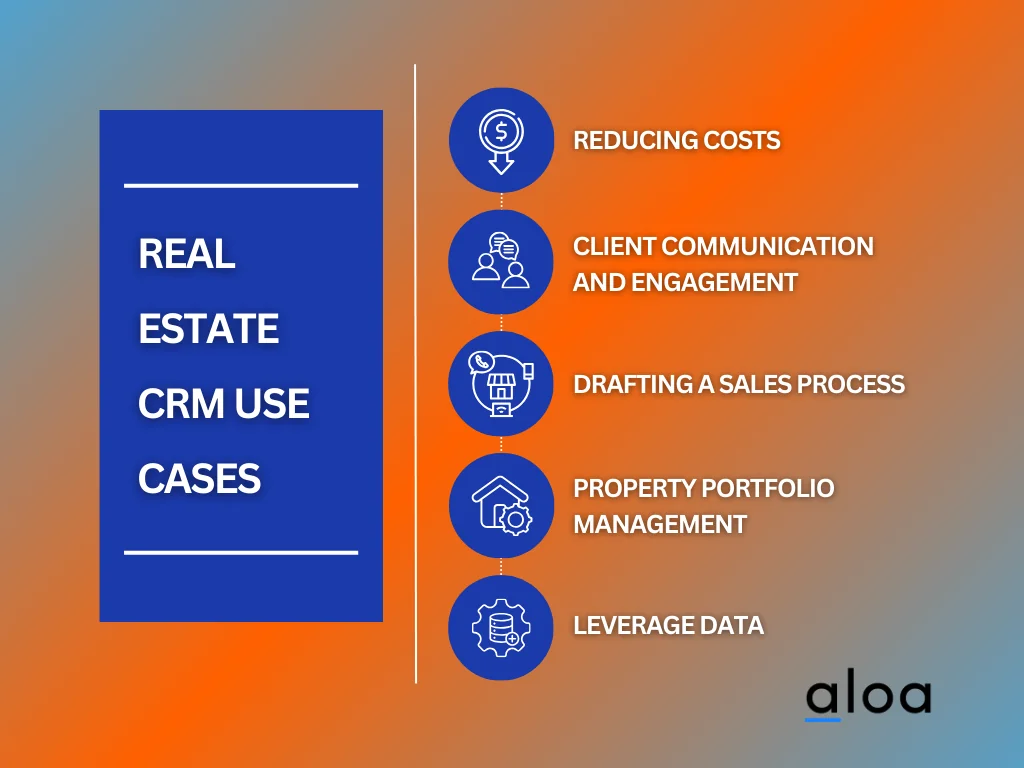
Reducing Costs
Managing a real estate business requires a lot of complicated processes, from handling paperwork to inspecting every avenue of the property to ensure that it passes all checks before being fit to be on the market. A robust CRM database can enable businesses by automating each step in the data processing sector to keep all the relevant information accessible in one platform.
Once a suitable automation process is established with your CRM process, businesses can expect a more streamlined and optimized method for improving their overall work efficiency. Since every day that passes in the real estate industry can potentially cost companies to make or break a sale, they must have a system that can optimize the busy work that can hinder their overall workload.
Client Communication and Engagement
Having a CRM system enables agents to keep track of important information that can help prospective sellers who require constant updates on the status of their property listings. Services such as automated messaging and a notification system to keep your team on track can ensure your company takes care of clients well and help build trust.
Companies can also use CRM's added client communication and engagement to personalize each client to ensure their specific requirements are always met. Tracking detailed information makes it easy to enforce a strong relationship by allowing the marketing and sales CRM department to develop strategies to improve relationships by using any important information on their past experiences as leverage.
Drafting a Sales Process
Agents often discuss what is a CRM in real estate during training sessions and how it can help improve managing multiple clients. However, another benefit companies can take advantage of with CRMs is to help draft an outline for their entire sales process. This process can involve past experience or other real estate agencies' success stories.
A good manager can use this opportunity to follow through on different customer journeys and use it to understand what makes that particular sale successful and utilize those methods to gain more potential clients. The company's strengths and weaknesses should be monitored to ensure better control of the outcome of each prospective sale.
Property Portfolio Management
As previously mentioned, CRMs are not only focused on tracking client data. Real estate businesses can also use this opportunity to keep a close watch on important properties under their portfolios. Each property closely monitored on a CRM allows companies to learn when a location becomes a prime candidate for sale based on factors such as trends and local market data.
Customizable fields also allow for detailed categorization, which makes it easy to search and showcase properties to potential buyers who are interested in specific facilities in a property. Make sure to categorize each property to fit different classifications to show off more options for prospective buyers.
Leverage Data
Leveraging data collection is essential to a successful real estate company. The more information that can be gathered on different locations, the easier it is to gain a stake on what are the best deals to get for your customers. This service can attract buyers and sellers to utilize your expertise through your extensive knowledge of market research as a viable method for them to get the best value.
Gaining and organizing information to discernable statistics allows your sales to use this knowledge to contact potentially interested clients through email marketing campaigns to spread the word if a property is currently trending on the market. Teams can also save time on gathering information, which speeds up the possibility of closing sales, which is always beneficial to gaining revenue.
Key Takeaway
Learning what is a CRM in real estate is an essential step for all businesses to grow and scale their services to reach more of an audience. A robust CRM serves as the cornerstone for effective property management, offering functionalities that range from centralized portfolio organization to streamlined transaction tracking and collaborative team efforts that can all potentially lead to more sales.
Recognizing the limitations of your real estate company can help in choosing the right CRM system for your company to utilize. Real estate agencies gain an edge against their competition by prioritizing an organized system.
If you are serious about taking your real estate services to the next level, contact us at [email protected] for more information.

